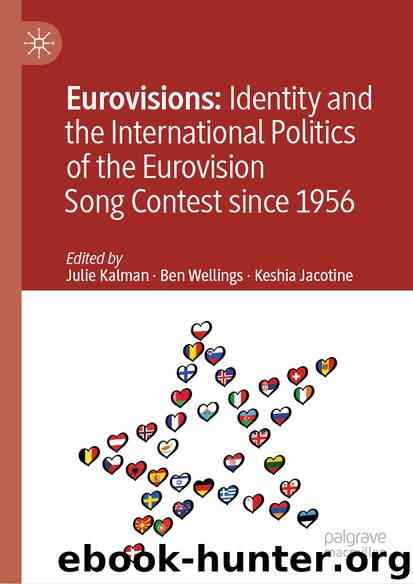Eurovisions: Identity and the International Politics of the Eurovision Song Contest since 1956 by Julie Kalman & Ben Wellings & Keshia Jacotine

Author:Julie Kalman & Ben Wellings & Keshia Jacotine
Language: eng
Format: epub
ISBN: 9789811394270
Publisher: Springer Singapore
An Independent Kosovo
Milošević—who was by then Yugoslav president—was deposed in October 2000 and extradited to The Hague in June 2001 to be tried for war crimes by the International Criminal Tribunal for the former Yugoslavia. With the change of government in Serbia, the second round of sanctions against Yugoslavia were lifted and JRT was permitted to re-enter the EBU. As Montenegro had sought to redefine relations within Yugoslavia so that each of the constituent republics could more independently govern its own affairs, Yugoslavia was in 2003 transformed into a loose state union that was renamed ‘Serbia and Montenegro’. Despite the marked difference in their population sizes—Serbia’s was 7.5 million, excluding Kosovo, and Montenegro’s 600,000—the two parts of the union had an equal say in state matters such as defence and foreign affairs. Their broadcasting organisations, Radio and Television of Montenegro (RTCG) and Radio and Television of Serbia (RTS), also had an equal say in their national selection for the ESC. Serbia and Montenegro debuted in the 2004 ESC with Željko Joksimović finishing in second place with the song ‘Lane moje’ (My Darling): the song’s success was a sign of the improvement of Serbia and Montenegro’s relations with other European states, especially as the entry received top points from Bosnia and Herzegovina, Croatia and Slovenia at a time when the voting was wholly based on the public televote. The former Serbian and Montenegrin foreign minister Goran Svilanović saw this as a positive development that would ‘help improve relations between the countries in the region’ (Petruseva 2005), although this example of ‘bloc voting’ would fuel criticism in the West European media against the voting predilections of the citizens of Central and East European states. Soon, however, the ESC became a political battleground between Montenegro and Serbia, as in the 2005 and 2006 national selections the representatives of RTCG were criticised for tactical voting in favour of the Montenegrin boy band No Name. The 2006 ESC turned into a tool for Montenegrin cultural diplomacy when the government of Prime Minister Milo Ðukanović scheduled a referendum on Montenegrin independence for 21 May, a day after the ESC was to be staged in Athens. In the 2006 national selection in Belgrade, No Name won again with the song ‘Moja ljubavi’ (My Love), whose lyrics could be read as having patriotic allusions and accordingly urging for Montenegrin independence. After RTS disputed No Name’s victory and could not come to an agreement on a common ESC entry with RTCG, Serbia and Montenegro ultimately did not participate in the 2006 ESC (Morrison 2009, pp. 215, 270). During the years that Serbia and Montenegro did participate in the ESC, Kosovan television services were no longer under the control of Belgrade and a new public service broadcaster, RTK, was instead established in 1999, with the EBU managing RTK’s transformation into an independent public service national broadcasting organisation in 2001. As RTK was thus not controlled by the Serbian national broadcasting organisation, it did not participate in the decision-making and political wrangling surrounding Serbia and Montenegro’s entries in the ESC.
Download
This site does not store any files on its server. We only index and link to content provided by other sites. Please contact the content providers to delete copyright contents if any and email us, we'll remove relevant links or contents immediately.
| Arms Control | Diplomacy |
| Security | Trades & Tariffs |
| Treaties | African |
| Asian | Australian & Oceanian |
| Canadian | Caribbean & Latin American |
| European | Middle Eastern |
| Russian & Former Soviet Union |
The Secret History by Donna Tartt(19088)
The Social Justice Warrior Handbook by Lisa De Pasquale(12190)
Thirteen Reasons Why by Jay Asher(8910)
This Is How You Lose Her by Junot Diaz(6887)
Weapons of Math Destruction by Cathy O'Neil(6280)
Zero to One by Peter Thiel(5802)
Beartown by Fredrik Backman(5754)
The Myth of the Strong Leader by Archie Brown(5507)
The Fire Next Time by James Baldwin(5445)
How Democracies Die by Steven Levitsky & Daniel Ziblatt(5218)
Promise Me, Dad by Joe Biden(5153)
Stone's Rules by Roger Stone(5088)
A Higher Loyalty: Truth, Lies, and Leadership by James Comey(4964)
100 Deadly Skills by Clint Emerson(4925)
Rise and Kill First by Ronen Bergman(4789)
Secrecy World by Jake Bernstein(4753)
The David Icke Guide to the Global Conspiracy (and how to end it) by David Icke(4719)
The Farm by Tom Rob Smith(4511)
The Doomsday Machine by Daniel Ellsberg(4490)
